Thursday Feb 19, 2026
Thursday Feb 19, 2026
Monday, 30 July 2018 00:04 - - {{hitsCtrl.values.hits}}

Mention Sri Lanka and tea, cricket, sea and safari typically come to mind. These are the more positive perceptions of the country. But political turmoil, policy confusion, currency depreciation and a bond scandal remain some of the negatives that the nation has yet to shake off.

In its early days, the coalition government pushed through substantial civil servant wage hikes that strained an already difficult fiscal position. Coinciding with a disastrous budget and at a time when the government was supposed to be addressing corruption, irregularities around a bond auction cost both the former central bank Governor Arjuna Mahendran and former Finance Minister Ravi Karunanayake their jobs.
Key infrastructure projects were stalled causing growth to slow, including the US$15 billion Port City project, which will encompass a financial district and residential property. And progress on other crucial development, like the airport expansion, has been slow.
Businesses were hurt by the imposition of a one-off super gains tax, banking and telco levies, sugar taxes and other ad-hoc revenue raising measures. In addition, investigations by the newly-established Financial Crimes Investigation Division have also weighed on sentiment.
Sri Lanka remains vulnerable to shocks with its high public debt, large financing needs and weak external position. These weaknesses are reflected in a sovereign credit rating of B+ by S&P and Fitch. And there appears to be a strong sense onshore that neither the coalition government nor its leaders individually will survive the next general elections due in 2020.
Understandably, global investors are wary of investing in a market marred by scandal, political uncertainty and a slowdown in growth. But Sri Lanka has made progress on important reforms and regardless of how the political leadership transitions there will remain a focus on infrastructure development.
The International Monetary Fund program has been successful, with notable improvements made on tax and fuel price reforms, and a rebuilding in forex reserves. Road connectivity is improving and some of the significant real estate development around Colombo is nearing completion, as is the land reclamation required for the Port City project. Real GDP growth 1 may rebound to 4.6% this year from 3.1% in 2017, with inflation around 5% through 2018.
Investment Insights: Politics, politics and politics
Politics weighed heavily on my mind during a recent visit to Colombo. In my meetings with current and former government officials and business executives, our conversations never strayed far from prospects of political change at the next general elections.
A transition in leadership could result in adverse policy changes or even derail progress on reforms. It can be argued a political change could be positive for growth by removing some of the uncertainty around policy that has partly been weighing on business sentiment. But it could also negatively impact expectations, particularly on the part of the rating agencies, if it involves the unwinding of important tax reforms, for example.
Former President Mahinda Rajapaksa’s party has made a significant come back, performing well in recent local elections, with the coalition government suffering from notable defections. With changes made to the constitution, neither himself nor his brothers can run for President and the sequencing of Presidential, General and Parliamentary elections, which are all due around the same time, will have important implications for political outcomes. Uncertainty is likely to crescendo through 2019 and as a bond investor, we are bracing ourselves for a messy and complicated election cycle ahead. Investors should be mindful of appropriately managing risk during this period, but also be on a lookout for opportunities that elevated uncertainty will likely create.
Bridging infrastructure gaps
Regardless of election outcomes in 2020, the focus will continue to be on infrastructure development, specifically a much-needed expansion of transportation and logistics infrastructure.
Tourism numbers have quadrupled over the past decade to 2.1 million2 in 2017, but this has put pressure on the transportation infrastructure, with the airport running at double its capacity. In addition, the Port of Colombo will hit full capacity in the next few years.
There hasn’t been any development of specialised industrial zones since 2002, so progress will have to be made on the plans to develop five locations that have been identified. Parts of the Port City project, mainly the planned International Financial Centre, could be up and running by 2023. Free trade agreements with China, India and Singapore are either already in place or will be concluded relatively soon. To better facilitate trade, the government is working with the World Bank to develop the infrastructure that will provide a single portal detailing all procedures relevant to import/export, and a National Single Window to provide a single transaction point between the trade community, private sector and government.
Even taking into account the political backdrop and election risks in 2020, we remain positive on the longer term outlook for Sri Lanka
Hence, with some reasonably good execution, Sri Lanka could see itself playing a greater role in areas such as tourism, logistics and services, and as a financial centre in the years ahead. Therefore even taking into account the political backdrop and election risks in 2020, we remain positive on the longer term outlook for Sri Lanka, supported by improvements in policy coordination, infrastructure development and strategic geographic advantages.
Risk versus reward
Why do we look at a bond market like Sri Lanka given the risks? Compared with some of the other frontier and even core bond markets in Asia, Sri Lanka has a relatively liquid market. Foreign ownership is low having been around only 5% as it is an off-benchmark trade for most investors and one that requires a significant amount of due diligence.
The local currency market is primarily domestically driven, which gives it a lower correlation and some resilience in the face of some of the external shocks that have hit broader emerging markets.
At the levels the market has traded at in recent years, an investor has more than adequately been paid to take risk. And therefore, even taking into account some anticipated currency depreciation, Sri Lanka has delivered some of the stronger returns in the region.
1. ‘The World Bank in Sri Lanka’, 12/04/2018
2. ‘Tourism growth trends, 1970-2017’, Sri Lanka Tourism Development Authority
Source: https://www.aberdeenstandard.com/en/insights-thinking-aloud/article-page/letter-from-sri-lanka